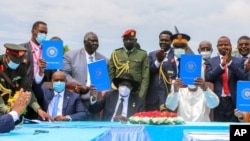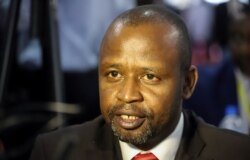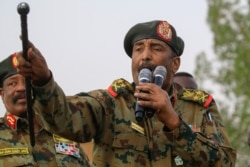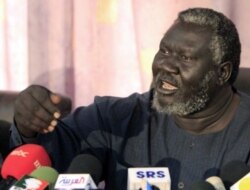Sudanese rebel leaders who returned to Khartoum this week said they are fully committed to implementing a new peace agreement with the government in good faith.
Al Hadi Idris, chairman of the Sudan Revolutionary Front, an umbrella organization of rebel groups which signed the deal with Sudan's transitional government, told reporters at a Tuesday news conference in Khartoum that he sees the deal as a golden opportunity "to build a new Sudan" in which all citizens are treated equally.
Idris said he and other opposition leaders returned to Khartoum this week with "open and sincere hearts."
"This agreement is great, unique and it is different from all other previous agreements. It has been signed in a different political environment, it has gained regional and international support and I am confident that Sudanese citizens will stand beside us and we all implement this agreement together," said Idris.
Under the deal signed in Juba, South Sudan, all opposition groups are now part of the transitional government, according to Idris.
"From today onwards, we will bear the consequences of all policies of the transitional government and take full responsibility for its decisions. We are aware that our Sudanese citizens are suffering greatly. There are shortages of fuel, bread and many other basic commodities. Our citizens have rights and deserve a better life than this," Idris told reporters gathered at the state-run Sudan News Agency office in Khartoum.
Last week, General Abdel Fattah al-Burhan, who heads Sudan's Sovereign Council, pardoned all armed groups who took up arms against the government with the exception of individuals charged with crimes against humanity and war crimes who are wanted by the International Criminal Court.
On Sunday, opposition groups were welcomed back to Khartoum by government officials during a peace celebration.
Speaking at that event, Malik Aggar, who heads the Sudan People's Liberation Movement North faction, said if the peace deal is implemented in good faith, it will pave the way for a peaceful environment across Sudan.
Aggar called on all Sudanese political forces to use the peace deal to rebuild the country's social fabric, which he said had been destroyed over the past three decades under the rule of ousted President Omar al-Bashir.
"We are coming to put our hands in the hands of our brothers in the political revolutionary forces, so that we are able to build the new Sudan based on equal citizenship without any sort of discrimination and I believe this is possible if we all work together, said Aggar, adding that he and other opposition leaders would "strive to see to it that Sudan doesn't witness any other separation."
Aggar said he is glad that the signed agreement calls for integrating government and opposition forces into one Sudanese army, something he said will exemplify Sudan's diversity.
"These forces are going to be united as one Sudanese armed force, the army that will represent our Sudanese diversity. In a short while, all these forces are going to be integrated into one united Sudanese army," said Aggar.
It is not clear when a unified army will be established. General al-Burhan said he expects to name three more members to the Sovereign Council soon, bringing the total number of council members to 14. Other changes are also expected to be made in Sudan's Cabinet in accordance with the peace agreement.










